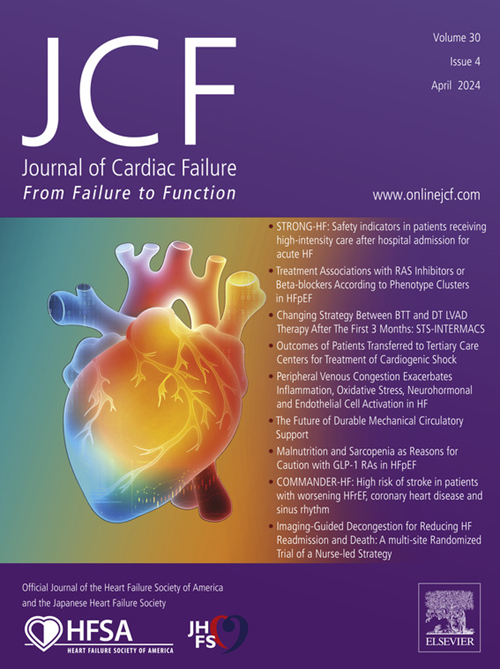心力衰竭患者的医学定制膳食:2013-2023文献系统综述
IF 6.7
2区 医学
Q1 CARDIAC & CARDIOVASCULAR SYSTEMS
引用次数: 0
摘要
背景:膳食干预具有改善心力衰竭(HF)患者症状和预后的潜力,但在进食营养丰富的膳食方面存在障碍。应对挑战的策略之一是提供医疗定制餐(MTM),即根据个人营养需求完全准备好的餐食。在这篇系统性综述中,我们考察了为高血压患者提供 MTMs 的研究的临床结果:我们检索了 CINAH、EBSCO/MEDLINE、EMBASE、PUBMED 和 Cochrane Central Register of Controlled Trials,以确定 2013 年至 2023 年间发表的 MTM 干预措施。我们纳入了六项研究。其中五项研究涉及钠限制。其中四项为随机对照试验,一项为匹配队列研究。样本量从 31 到 641 不等。患者人群包括心力衰竭、急性失代偿性心力衰竭和射血分数保留型心力衰竭患者。其中一项研究涉及对射血分数保留型心力衰竭和肥胖症患者进行能量限制。这是一项随机对照研究,样本量为 100 人。在一项研究中,根据 "膳食疗法治疗高血压 "目标进行的限钠干预降低了 90 天高血压再入院率,而在另一项研究中,30 天和 12 周高血压再入院率呈改善趋势。能量限制干预降低了舒张压、体重和炎症生物标志物,改善了生活质量(QoL)和心肺功能。这两项干预措施对死亡率均无影响:结论:为高血压患者提供限钠 MTM 可降低再入院风险。为肥胖的高血压患者提供能量限制型 MTM 可改善症状、减轻体重、提高生活质量和心肺功能。需要进行充分的随机对照试验来证实这些效果并研究其潜在机制。本文章由计算机程序翻译,如有差异,请以英文原文为准。
Medically Tailored Meals in Heart Failure: A Systematic Review of the Literature, 2013-2023
Background
Dietary interventions have potential to improve symptoms and outcomes in patients with heart failure (HF), but there are barriers to eating nutrient-dense diets. One strategy to address challenges is to provide medically tailored meals (MTMs), fully prepared meals that align with an individual's nutritional needs. In this systematic review, we examined clinical outcomes of studies that provided MTMs to patients with HF.
Methods and results
We searched CINAH, EBSCO/MEDLINE, EMBASE, PUBMED and the Cochrane Central Register of Controlled Trials to identify MTM interventions published between 2013 and 2023. We included six studies. Five studies involved sodium restriction. Four of these were randomized control trials and one was a matched cohort study. Sample sizes ranged from 31 to 641. Patient populations included individuals who had heart failure, acute decompensated heart failure and heart failure with preserved ejection fraction. One study involved energy restriction in patients with heart failure with preserved ejection fraction and obesity. This was a randomized controlled study with a sample size of 100. Sodium-restriction interventions, when aligned with Dietary Approaches to Stop Hypertension goals, reduced 90-day HF readmissions in one study and trended towards improving 30-day and 12-week HF readmissions in another. The energy-restriction intervention reduced diastolic blood pressure, weight, and inflammatory biomarkers, and improved quality of life (QoL) and cardiorespiratory fitness. Neither intervention had an impact on mortality.
Conclusions
Provision of sodium-restricted MTMs to patients with HF may reduce the risk of rehospitalization. Provision of energy-restricted MTMs to patients with HF and obesity can improve symptoms, weight loss, QoL, and cardiorespiratory fitness. Adequately powered randomized controlled trials are needed to confirm these effects and investigate underlying mechanisms.
求助全文
通过发布文献求助,成功后即可免费获取论文全文。
去求助
来源期刊

Journal of Cardiac Failure
医学-心血管系统
CiteScore
7.80
自引率
8.30%
发文量
653
审稿时长
21 days
期刊介绍:
Journal of Cardiac Failure publishes original, peer-reviewed communications of scientific excellence and review articles on clinical research, basic human studies, animal studies, and bench research with potential clinical applications to heart failure - pathogenesis, etiology, epidemiology, pathophysiological mechanisms, assessment, prevention, and treatment.
 求助内容:
求助内容: 应助结果提醒方式:
应助结果提醒方式:


